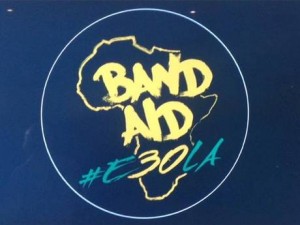 That’s right. Your 24/7 Christmas music playlists and stations are likely to have the Band Aid 30 updated version of “Do They Know It’s Christmas?” in full rotation this season, topping sales charts with the charitable intent of raising money to help fight the Ebola pandemic in West Africa.
That’s right. Your 24/7 Christmas music playlists and stations are likely to have the Band Aid 30 updated version of “Do They Know It’s Christmas?” in full rotation this season, topping sales charts with the charitable intent of raising money to help fight the Ebola pandemic in West Africa.
Cathleen Falsani has written over at her Patheos blog about how the original song and Live Aid concert in 1984 inspired her with tiny glimmers of awareness about global poverty and hunger: “A seed of curiosity about my connection with and responsibility to fellow human beings on the other side of the world was planted and has continued to grow throughout my life and professional career.” I’m impressed that something meaningful came from such schmaltz. I just remember thinking it was omigodsoawesome that Boy George was in it! (Confessions of an 80s teen: I loved Boy George.)
More recently, though, my more thoughtful and critical self has wondered how such an insulting song can be taken seriously. Do they know it’s Christmas? Really? 1) who doesn’t know when Christmas is? 2) why would you assume “they” a) are Christian and b) care?, because 3) what difference does it make whether it’s Christmas or not when your community lacks the infrastructure to prevent the spread of a disease that kills an overwhelming number of those who contract it?
It’s the most ridiculous and colonial assertion of Christian privilege that permeates a season already filled with the imposition of Christmas on unsuspecting masses. A few years ago, Tod Goldberg wrote a great piece with a line by line analysis of why Do They Know It’s Christmas? is “the most insufferable Christmas song ever.” One line from the original that persists into the latest 30th anniversary version is this:
“And in our world of plenty we can spread a smile of Joy / Throw your arms around the world at Christmas time.”
… and Goldberg’s comment:
“Unless, of course, you try to throw your arms around a place that doesn’t celebrate Christmas — like, you know, large parts of Africa — and instead of spreading joy, you end up starting 25 years of sectarian civil war.”
It’s the kind of othering of Africans (and ignorance about the consequences of white racial narcissism) that has always been a prerequisite for the colonial and neocolonial impulse. It replicates the White Savior Industrial Complex that Teju Cole and others have written about, a tendency of white people to swoop in and try to “save” nonwhite people rather than listening to them, rather than acknowledging their agency and history of resistance, rather than making systemic changes that can lead to stable and sustainable communities:
“If Americans want to care about Africa, maybe they should consider evaluating American foreign policy, which they already play a direct role in through elections, before they impose themselves on Africa itself.”
I wrote about the misplaced fears related to the Ebola outbreak around Halloween this year, noting that:
“Actually, we should all be worried about the Ebola epidemic in West African countries and how its spread is threatening to weaken their economies and our interconnected global society. We should be worried about our neighbors in Liberia and Sierra Leone and Guinea, and fear that the future is eroding in front them. And we should be worried about stigmatization of people in the U.S. who are connected with this region. Even children who have never been there. We need to worry about how racism and ethnocentrism are shaping our responses.”
At the end of his piece, which was written in context of the Kony2012 campaign and was thick with political analysis, Cole’s words lead us back to the musical charity of Band Aid 30:
“All of this takes us rather far afield from fresh-faced young Americans using the power of YouTube, Facebook, and pure enthusiasm to change the world. A singer may be innocent; never the song.”
A listener may be innocent, never the consumer.
If you are interested in learning more about Ebola from the BBC and Doctors Without Borders, click here and here.
If you are interested in supporting efforts to help via Doctors Without Borders and The Red Cross, click here and here.












